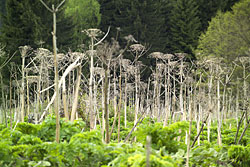Invasive species
Biological invasions are world-wide among the greatest threats for biodiversity. Globally, particularly on islands but also in Australia and America, species and ecosystems are threatened by biological invasions or have been modified entirely.

The giant hogweed stemming originally from the Caucasus expatiates more and more on Central Europe.
Photo: André Künzelmann/UFZ
Europe-wide the problem is less dramatic, but becomes fortified by proceeding land use changes and climate change. Thus there are shifts in communities of species and food webs, changes in flows of nutrients and impact on ecosystem functions. The UFZ research particularly addresses the causes and effects of biological invasions, with focus on evolutional processes, changes in population dynamics and comparison of distribution patterns of native and non-native species.
Projects & Contact
Titel:
ALARM, Assessing large scale risks for biodiversity with tested methods
Department:
Community Ecology
Contact:
PD Dr. Josef Settele, Dr. Ingolf Kühn, Dr. Stefan Klotz
josef.settele@ufz.de
ingolf.kuehn@ufz.de
stefan.klotz@ufz.de
Remarks:
EU: integrated project with global dimension
Title:
DAISIE, Delivering Alien Invasive Species Inventories for Europe
Department:
Community Ecology
Contact:
Dr. Stefan Klotz, Dr. Ingolf Kühn
stefan.klotz@ufz.de
ingolf.kuehn@ufz.de
Remarks:
EU project
Title:
Invasions, Research on biological invasions including legal and economical evaluation
Departments:
Community Ecology, Environmental and Planning Law
Contact:
Dr. Stefan Klotz (BZF), Wolfgang Köck (UPR)
stefan.klotz@ufz.de
wolfgang.koeck@ufz.de
Remarks:
BMBF project
Title:
Role of ecological interactions and evolutionary processes for the success of invasive plant species
Department:
Community Ecology
Contact:
Dr. Harald Auge, Dr. Oliver Bossdorf
harald.auge@ufz.de
oliver.bossdorf@ufz.de
Remarks:
Title:
Research on the spread of wild animal diseases based on ecological-epidemiological models
(e.g. rabies, swine fever, foxtape worm)
Department:
Ecological Modelling
Contact:
Dr. Hans-Hermann Thulke
hans-hermann.thulke@ufz.de
Bemerkungen:
